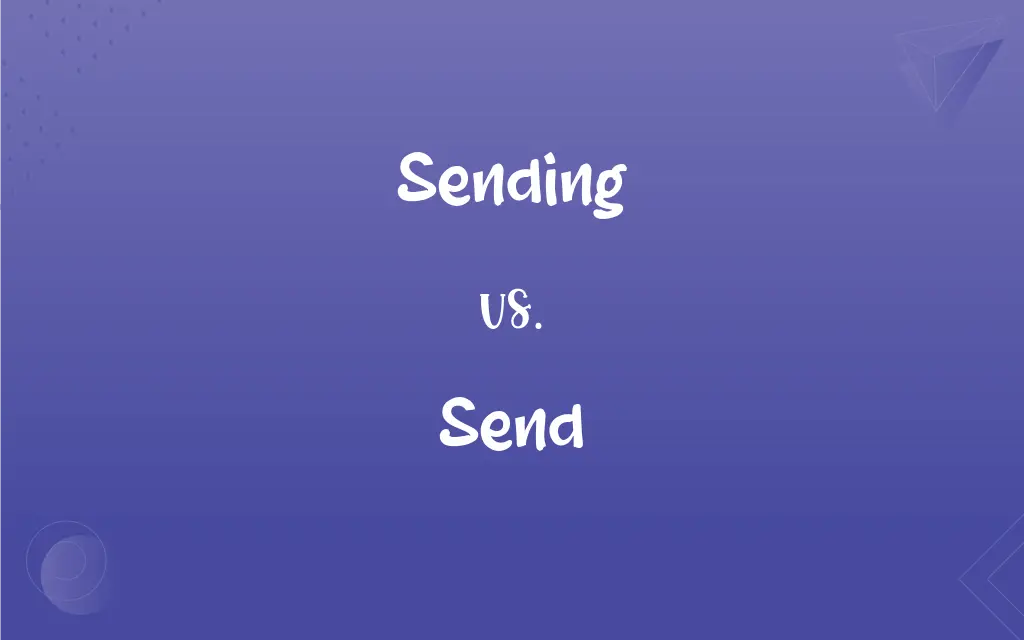Sending vs. Send: What's the Difference?
Edited by Aimie Carlson || By Janet White || Updated on November 11, 2023
Sending is the present participle of send, indicating the action of dispatching something, while send is the base verb form used to command or describe the action of dispatching.

Key Differences
Sending, as a present participle, is used in continuous tenses, indicating an ongoing action of dispatching something. In contrast, send is the base form of the verb, used in various tenses to indicate the action of causing something to go or be taken to a place.
Sending can be used to describe an action in progress, as in "I am sending an email." Send, however, is used in simpler constructions like "I send emails every day," showing a habitual or general action.
Sending often appears in progressive tenses or as a gerund, whereas send appears in simple, perfect, and imperative forms. For example, "He has sent the package" (perfect tense) versus "He is sending the package" (progressive tense).
Sending implies a continuous or current action, such as "She is sending a message now." Send, on the other hand, is more versatile, used in various grammatical structures like commands: "Send me the report."
Sending is also used as a noun in some contexts, referring to the act of dispatching. Send, however, is purely a verb, representing the act itself in various tense forms, such as past (sent), present (send), and future (will send).
ADVERTISEMENT
Comparison Chart
Part of Speech
Present participle (verb form)
Base form of the verb
Usage in a Sentence
Indicates ongoing or continuous action
Used in simple, perfect, imperative forms
Tense
Commonly used in progressive tenses
Used in various tenses
Example Usage
"I am sending a letter."
"I will send a letter."
Grammatical Role
Can also function as a gerund or noun
Purely a verb with no noun form
ADVERTISEMENT
Sending and Send Definitions
Sending
The act of causing something to go somewhere.
The sending of the package was delayed due to bad weather.
Send
To dispatch an object or communication to a recipient.
I'll send a replacement product immediately.
Sending
Indicating an action in progress of transmitting.
She was sending a text message when the call came.
Send
To transmit a message, email, or another form of communication.
Did you send the email to the client?
Sending
Used as a noun, referring to the act of dispatching.
The sending of troops to the conflict zone was controversial.
Send
To cause someone or something to move or go.
The coach will send the players onto the field.
Sending
Present participle of send, used in continuous tenses.
They are sending help to the affected area.
Send
To cause to go or be taken to a particular destination.
Please send the documents by express mail.
Sending
Referring to the process of dispatching or transmitting.
Sending emails has become a routine part of our workday.
Send
To direct or propel something towards a destination.
The storm sent waves crashing against the shore.
Sending
To cause to be conveyed by an intermediary to a destination
Send goods by plane.
Send
To cause to be conveyed by an intermediary to a destination
Send goods by plane.
Sending
To dispatch, as by a communications medium
Send a message by radio.
Send
To dispatch, as by a communications medium
Send a message by radio.
Sending
To direct to go on a mission
Sent troops into the Middle East.
Send
To direct to go on a mission
Sent troops into the Middle East.
FAQs
What is the meaning of sending?
It refers to the act of dispatching something or the present participle of send.
What does send mean?
Send is a verb that means to cause to go or be taken somewhere.
How is send used in past tense?
As 'sent', e.g., "She sent the letter yesterday."
Is sending only used in continuous tenses?
Primarily, yes, it indicates an ongoing action in continuous tenses.
Can sending be used as a noun?
Yes, in some contexts it acts as a noun, referring to the act of dispatching.
What is an example of using sending in a sentence?
"They are sending reinforcements to the area."
Does sending always involve physical items?
No, it can refer to sending anything, including messages or signals.
Is send used in different tenses?
Yes, it's used in various tenses like present, past, and future.
Can send be used in commands?
Yes, it's often used in imperative form, like "Send me the file."
Is send used in formal communication?
Yes, it's commonly used in both formal and informal contexts.
How is send used in future tense?
With will or going to, e.g., "I will send the report tomorrow."
Is sending used in progressive forms?
Yes, it's commonly used in progressive verb forms.
Can send be used metaphorically?
Yes, like "send someone into a panic."
Can sending imply a future action?
Not usually, it typically refers to an ongoing or current action.
What is the infinitive form of sending?
The infinitive form is "to send."
Is sending used in everyday speech?
Yes, particularly in conversations about ongoing actions.
Can send refer to emotional responses?
In a metaphorical sense, yes, like "send shivers down one's spine."
Does sending have a different meaning in technology?
It retains its basic meaning but is often used for electronic communications.
Can send be used in a passive form?
Yes, like "The package was sent by courier."
Is sending a regular verb?
Yes, as it follows the regular verb conjugation pattern.
About Author
Written by
Janet WhiteJanet White has been an esteemed writer and blogger for Difference Wiki. Holding a Master's degree in Science and Medical Journalism from the prestigious Boston University, she has consistently demonstrated her expertise and passion for her field. When she's not immersed in her work, Janet relishes her time exercising, delving into a good book, and cherishing moments with friends and family.
Edited by
Aimie CarlsonAimie Carlson, holding a master's degree in English literature, is a fervent English language enthusiast. She lends her writing talents to Difference Wiki, a prominent website that specializes in comparisons, offering readers insightful analyses that both captivate and inform.
































































